#like virgil guiding dante through hell
Explore tagged Tumblr posts
Text
My dad never speaks to me, but when he did today was just to provide the perfectly on spot comment triggering my depressive thoughts.
I'm now writing the most angsty piece of Troy fic I ever wrote instead of the request I wanted to finish.
#and it of course involves hector#because everytime i'm rock bottom down i somehow end up writing hector fics#he is the companion of my depression#like virgil guiding dante through hell
3 notes
·
View notes
Text
dante and virgil in hell by william adolphe bouguereau
"o let us go, the poet cried, | for our sick souls this friendly guide | in pity comes to chase away | the fiendish night that held us sway."

#art#artist#dante and virgil#dante and virgil in hell#william adolphe bouguereau#oil on canvas#painting#poetry#poem#poesie#1850#musée d'orsay#paris#france#academic art#light academism#dark academism#academism#virgil is dante's guide through hell and purgatory#neoclassicism#romantacism#impressionism#realism#lover#virgil then “put his arms around [dante's] neck/ and kissed [his] face”#(Inferno. VIII 43–44)#dark acadamia aesthetic#dark acdemia#greek mythology#pull me like an animal out of a hole
20 notes
·
View notes
Text
Allusions in Make the Exorcist Fall in Love
So far in Make the Exorcist Fall in Love there’s been a lot of allusions to various texts. I thought it might be fun to compile all the ones people have noticed so far as far as I've seen. Some of these are more speculative than others and I will update as I go along. Also, I read Ekuoto as free first read chapters on Mangaplus so unfortunately I can’t go back and check much so this is largely through memory, so if anyone has anything else to add I would greatly appreciate it! All I’ve got is a few screenshots and a dream. If I get anything wrong feel free to correct me! I’ve organized this in order of allusions I’m confident about to allusions I’m less so confident about.
CW: reference to sexual violence
Dante's Divine Comedy and Vita Nuova: Dante Alighieri
This one is pretty obvious since there are characters directly named after the characters figured in Dante’s Inferno. It’s been a long time since I read it, but other details are also taken from the text, such as the frozen center of hell where Satan is located.
Lmao Leah from the Bible (who is probably Leah’s namesake) also shows up in Dante’s Divine Comedy apparently in Purgatorio.
Ok also super important to Dante retellings r Beatrice, who’s used as a symbol of divine love and is instrumental to Dante's journey through hell, purgatory, and paradise, so of course Ekuoto Dante advises Priest to fall in love lmao. So far though there hasn’t been a direct Beatrice in narrative (which there might never be one since the text has already made the Dante-Virgil connection an active choice of Virgilius's to reference the Divine Comedy rather than just an allusion by the author).
To be so real though I figure that Vergilius is probably also intended to be the Beatrice in this narrative.
The points I would draw attention in support of this would be these: 1. Beatrice is the woman who Dante has been in love with since early childhood but unable to ever be with because they both married others. Ekuoto Virgilius and Dante have known each other since childhood, and have something going on. 2. Beatrice is, like Virgil, one of Dante’s guides (through part of purgatorio and paradiso) 3. We still don’t know what Virgilius’s name was before he took that one on. Beatrice does not have a masculine form in current use and I tried finding some sort of nickname that would work and was unable to do so. However. Beatrice’s name is rendered in Japanese as ベアトリーチェ, and Beato is at least a surname. Then again, I’m not sure anyone has both a first name and last name except for Imuri so far???
"Book of Tobit"
I wasn’t familiar w this one so I didn’t notice it until I saw posts pointing it out, but the Asmodeus flashback was a retelling of the book of Tobit. Other people have already done analysis of this so I’d recommend checking other’s out. Unfortunately I failed to save the link to any of them so I can’t pass any along :’) Belfagor arcidiavolo: Machiavelli
Another one that I wasn’t familiar with but have seen people referencing. As above, I recommend checking out other’s analysis. "Those Who Walk Away from Omelas": Ursula K. Le Guin

The Brothers Karamazov: Fyodor Dostoevsky
Ok major spoilers and I also highly recommend this book, but also, its super long so I don’t blame anyone who chooses not to read. This book is about the most disgusting father alive and his three, maybe four, sons: Dimitri, Ivan, Alyosha, and maybe Smerdyakov (rumored to be an illegitimate son). Most of the action follows Alyosha, who is the youngest and probably the most idealistic character in the novel, at least in the beginning. Alyosha starts out as a novice in the local Russian Orthodox monastery under the purview of Father Zossima, an elder who really emphasizes love in religious practice. There's a series of chapters that cover a theological debate between Ivan and Alyosha.
In this theological debate, Ivan is arguing not that God doesn’t exist, but that the foundation of the world as understood by Christianity is something he fundamentally rejects.
Quotations from the Signet Classics edition:
“I don’t accept this world of God’s. Although I know it exists, I don’t accept it at all. It’s not that I don’t accept God, you must understand, it’s the world created by Him I don’t and cannot accept” (Dostoevsky 266) - “If all must suffer to pay for eternal harmony, what have children to do with it?....I understand solidarity in sin among men. I understand solidarity in retribution too; but there can be no such solidarity with children. And if it is really true that they must share responsibility for all their father’s crimes, such a truth is not of this world and is beyond my comprehension” (Dostoevsky 276)
“Imagine that you are creating a fabric of human destiny with the object of making men happy in the end, giving them peace and rest at last. Imagine you are doing this but that it is essential and inevitable to torture to death only one tiny creature—that child beating its breast with its fist, for instance—in order to found that edifice on its unavenged tears. Would you consent to be the architect on those conditions?” (This quotation, although from a different translation, is the one that inspired Omelas - I think the bowling alley theological discussion between Virgilius and Priest bears some similarities to this conversation. Its not a debate about the existence of god, but rather a debate whether or not the world envisioned by Christianity is inherently unjust or not. Demian: Hermann Hesse
“The bird fights its way out of the egg. The egg is the world. Who would be born must first destroy a world. The bird flies to God. That God's name is Abraxas”

Potential references but tbh they’re a bit of a stretch:
“Book of Martha”: Octavia Butler
"Book of Martha" is an Octavia Butler short story in the Bloodchild collection about an ordinary woman who is visited by god one day who tells her to choose one thing to change about people to try and make the world a better place. It’s a very short read and I’d recommend reading it before you read the next sentence where I’ll spoil the end.
She eventually decides that the thing to focus on is people’s dreams. Specifically, to give them the things they desire most within their dreams, in the hope that people will be less violent to each other in real life. A stretch, but Octavia Butler comes from similar recommendation circles as Ursula K. Le Guin (feminist science fiction authors with overlapping periods of activity) so I don’t think it’s impossible for the most recent chapters' use of dreams to hold some sort of inspiration from this short story. Again, this one is a pretty big stretch, as the idea of dreams to escape reality is pretty common.
The Monk: Matthew Lewis
Ok! So! Demon seduces a person is like not at all an original story (The Daemon Lover, Cazotte’s The Devil in Love, etc etc). BUT! The Monk is specifically a story that’s like. What if there was this extremely virtuous young man who has never lived in the outside world ever because he was raised in the church as an orphan and then the devil sent a demon girl to seduce him.
I have not finished the book yet so I can’t comment in depth on it other than to say the concept is similar but the execution so far is very different (It's a fairly misogynistic text. Ambrosio turns evil in ways that I doubt Priest will because thematically they’d go completely against the story. Also, The Monk is veryyy lurid in terms of Lust is Evil!!! And will turn you into a murdering maniac!!!! Because evil women are out there seducing you!!! Whereas so far sexual desire in Ekuoto has been handled as a perfectly natural thing, but complicated by religion, patriarchy, trauma, etc.)
This is all I have so far but I'd be interested to see if anyone else has any other ideas!
46 notes
·
View notes
Text
Scott pilgrim is a modern retelling of Dante’s Inferno, and I want to talk about it
Hi . Brought this up very briefly a while ago but i rewatched spto with friends last night and got my gears turning. I don’t usually make posts like this but It’s been on my mind and I want to share. Here we goooo. Under read more becwuse I wish not to disturb my beloved friends with a long post
First off, let’s start with theeeee obvious.
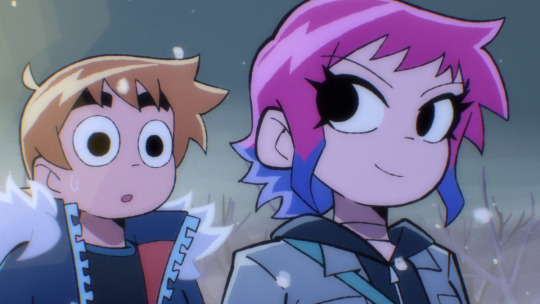
Say hello to our Dante and Beatrice.
I don’t think I need to go into this first one much, but Scott and Dante are of course the heroes(term used lightly. Scott is not a good person and honestly neither was fuckinh Dante of all people) of their respective tales, going through hell and back to win over this ethereal, “too good to be true” heavenly dream girl. Scott even dies to get her in the end, like Dante venturing down into the depths of hell, dying and then ascending to get to Beatrice. If I wanted to really stretch it I could say the dreamscape is a sort of purgatory but I don’t think there’s enough evidence for that one.
Next,

Our Virgil. What’s up, Wallace.
In the comics Wallace acts as a sort of guide to Scott. We end up seeing him less as the comic progresses, which I find lines up with Virgil having to part ways with Dante before he enters heaven. Not much to say otherwise admittedly. Love you though buddy
Now for the symbolism of hell. Since there are nine circles of hell, it obviously can’t match up one to one with the exes unless we add some of scott’s relationships to the mix, which both doesn’t make sense, causes this analysis to get stupider than it already is, and leaves some characters left over that already don’t fit in to these parallels.
Luckily, however, there are The Seven Deadly Sins. Going to be going in sin order rather than ex order here
Firstly,
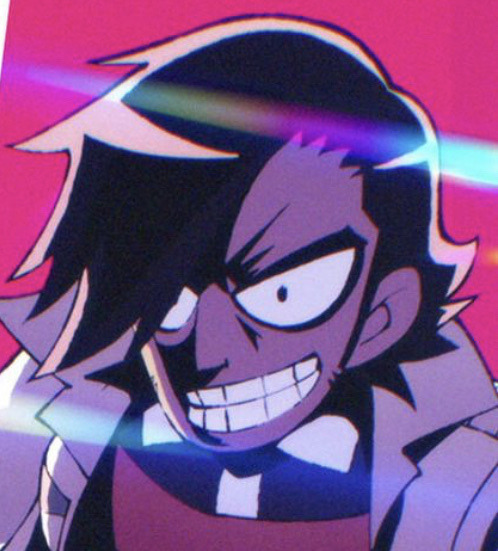
MATTHEW PATEL - PRIDE
- the first boyfriend and the first sin very conveniently line up, which threw me off track because I thought the exes would go in the order of the sins. Enyways
- in the movies, comics, and shows, he is insanely flashy with how he presents himself. It’s the entrance, the dances, the expressive clothing (“that guy’s dressed as a pirate” “pirates are in this year!”, modifying Gideon’s suit to fit his color palette, the outfit he wore while kicking gideon’s ass). The theatre kid in him essentially
- taking the lead in the musical Knives and Stephen presented him with— they knew how to cater to him, because he views himself as the coolest bitch on the planet. Which honestly he kind of is but don’t tell him this
- so headstrong in his pride that he fucks up. Repeatedly. First to get killed, too cocky, spends all of gideons money “I’ve lost billions!”
- believes he’s entitled to Ramona as soon as he wins the fight against Scott
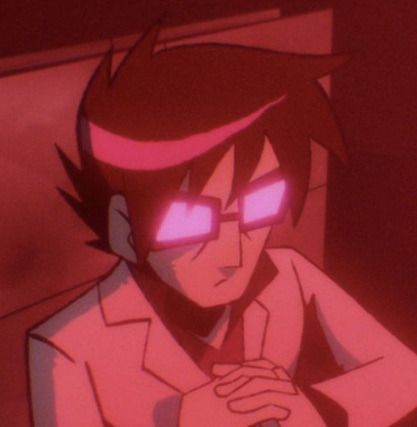
GIDEON- GREED
- I don’t feel like I have to explain this one but I will because I enjoy him greatly
- CEO, billionaire. Money money money mr rich
- literally “owns” or tries to excersize ownership Ramona in the comics and movie as if she belongs to him— with the glow, or with the chip implanted into her neck with his logo on it.
- has all of his past girlfriends cryogenically frozen. All for him none for anyone else. They should only love meeeeee.
- wants everything for himself in excess. Women, fame, money. Almost considered pride for him also but greed is more fitting
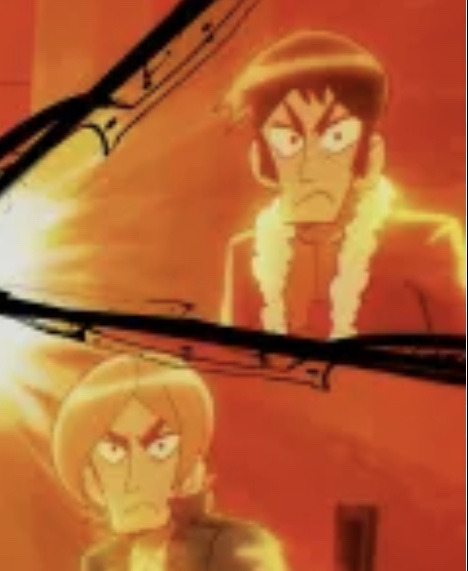
KEN AND KYLE- ENVY AND LUST
- holy shit this image has five pixels so sorry about that I’m on my phone and Google images sucks
- anyways of course they’re sharing sins
- not much to say here as they don’t show up much, and it’s easy to make the argument of envy or lust for ANY of the seven exes. These two were the hardest to figure out. Not as sure on Envy, but can definetly advocate for lust— playing around with women, thinking they were playing around with Ramona.

TODD- GLUTTONY
- this one was the easiest one for me. Like come on
- breaks vegan edge in the comics, movie, (vegan police), and show (Wallace breakup event 2 dead 5 injured)
- his whole persona revolves around food. Of course gluttony doesn’t always mean food but here it most definetly equates. Even when he’s vegan he always makes it a talking point of how superior he is to others because of this fact, only for it to blow up in his face when his enjoyment of non vegan food catches up to him.
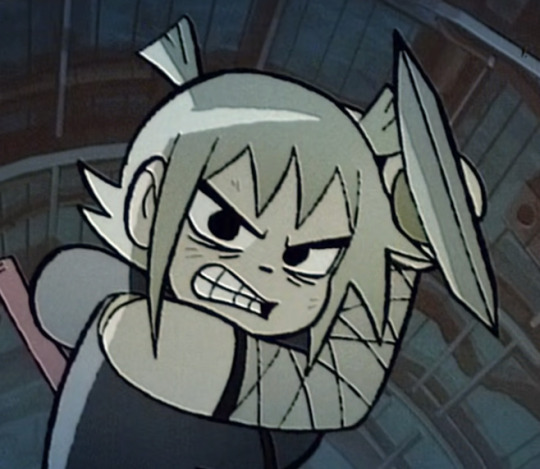
ROXY- WRATH
- a very angry girl to be sure. Takes her emotions out using violence, attacking Ramona the first time she sees her, even though she is going out of the order of the league and supposed to be attacking Scott (although I guess that point is moot because they all think he’s dead at that point)
- “I’m bi-furious” line from the movie deserves a shout out here I think
- (completely justified) Unending rage against Ramona in the show, and scott in the comics and movies. She is PISSED.
Lastly,

LUCAS LEE- SLOTH
- also one of the easiest ones. Could have made an argument for pride (tries to prove he can land a sick ollie so hard that he dies) or greed (movie star who lives in huge mansion), but sloth ultimately fit the bill the best.
- even before we get into his reoccurring theme of “whatever” in the show, it’s pretty evident in the comics and movie that he doesn’t care enough to extend effort. He tells Scott he’ll leave him alone and say his ass got kicked if Scott gave him a twenty dollar bill, sends his stunt doubles to fight Scott in his stead.
- onto the show, he lets his stardom slip out of his fingers with his attitude, not even caring to read or memorize the script anymore (“is that why half the lines in your last film were ‘Let’s Party’?” “I uhh, read the title.” Etc). Just spends all his time messing around and skateboarding. The title of his episode is literally “Whatever”. He doesn’t give enough of a shit to care. Which. Respect I guess
Extra; the exes ARE referred to as “the seven deadly chumps” in the show.
In conclusion;
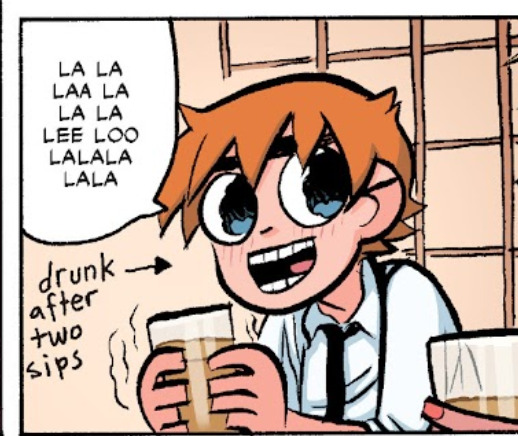
#Scott pilgrim#ramona flowers#Wallace wells#matthew patel#gideon graves#todd ingram#roxy richter#lucas lee#kyle katayanagi#ken katayanagi#scott pilgrim takes off#scott pilgrim vs the world#writing#not ocs#this took me an hour to write tghis is why there’s so many tags.#anyways thank you bye bye
160 notes
·
View notes
Text
Rambling about the divine comedy that might come to play in Dante’s canto
The writing
Y’all can ignore this since right now its [REDACTED]’s canto but rereading the divine comedy had me thinking
Inferno’s writing was, pls forgive my french, dogshit. From what i can deduce, it just him gloating of how good of a writing he is and dissing anyone and everything he didnt like by putting them in hell.
But his writing are significantly increase as it reached to Purgatory and becoming more philosophical and poetic as it finally reached to paradiso
Dante as of right now, still inexperienced and passive. But evidently showed on each passing cantos, there are times where Dante actually showed his capability as a manager even if it just a moment. Additionally he started to think, the strategized and our clockie also started a therapy session with their sinner (which in a way parallel of how he’s becoming more mindful in purgatorio layer)
Once Dante’s note starting to ‘Yi sangify’ then we are reaching peak/j
Dante’s guide in the orginal work
Anyone who have read the divine comedy know that the most important figure who play an important role in Dante journey is Vergilius (or Vergilio), which to say that’s not a uncommon fact anymore since here we are mr. Red Immortal poet (korean word play for Gaze) worked as the a guide. But just like how Mr Red Gaze once said that he will stay in this hell made from his karma, Vergilio in the original work can only accompany Dante til Purgatorio. (And i shit u not that was the most emotional moment i’ve ever read). Vergilius in limbus may act cold and jaded in some part of the canto but reading Leviathan and the divine comedy, i can assure u that he cares, he cares enough to break one of the contract clause to hold back the peccas for LCB team (cant wait for the parallell of ‘Virgil walked through the fire just so Dante wouldn’t have to do it alone’)
Now if Virgil can’t go to paradiso, then who guide Dante through his next journey? It’s Beatrice, Dante’s wife in the divine comedy.
(Also i would like to add another note that Virgil mention how he remembered Beatrice’s eyes and how beautiful they are, and even after his journey, he never got to see them with Dante so do what u will with that)
As come in to play, Virgil inability to guide Dante up to paradiso i worth mentioning: Dante thought of Virgil as a great philosopher and mind, representing logic and reason. And while these aspect may help ascend him to the Divinity, ultimately it wasnt enough when time comes. But instead, it was Beatrice, Dante’s love who lead him where all intellect fail. ‘If there is no love, it cannot be seen’.
I havent finished reading paradiso but from my understanding: Paradiso is basically space (here stars come into play), Dante can now stare at a sun, and the first tier of paradiso is the moon. Now here’s the interesting part, upon stepping on the moon, Dante immediately ask if Cain is there and to give more context, the crater of the moon was wildly believed to be the mark of Cain back then. Beatrice if set in a PMverse can either a. An Angelica or B. A Carmen cuz Dante’s love for her is real and genuine but her presence if i can describe ‘a beautiful eldritch horror of a girlfriend’
Will update more after finishing reading
24 notes
·
View notes
Text
Imagine Tenzin, consumed by grief after Lin's passing, deciding to follow her into the afterlife.
After reading the bittersweet fanfic "Meant To Be" by @risingsoleil (check her ao3 page if you are a linzin fan. She's an amazing writer. I love her works!), an idea came to me: what if Tenzin journeyed through the 9 circles of Hell before reuniting with Lin in Paradise? Drawing from Dante Alighieri's Divine Comedy, specifically Dante's Inferno, Tenzin would confront his deepest fears and regrets in each circle, leading to a powerful and emotional reunion with Lin in the afterlife.
So here's Tenzin:

(Sorry about the arrow, I just added that detail because Picrew doesn't have that option.)
I chose a red arrow instead of blue to symbolize that he took his own life, which is why he's in Hell (all life is sacred). I dressed him in a red robe and added a golden choker. Finally, he has an earring with Lin's eye color, given to him by his guide.
His guide, Iroh:

In this story, He is Tenzin's Virgil, guiding him through the 9 circles of Hell. Lin asks Iroh to help Tenzin on his journey and gives him the earring that Tenzin wears. It's a symbol of Lin's presence with him throughout the journey.
Lastly, Lin:

(Can I just say she looks so pretty, I also added the scars)
Tenzin's Beatrice is waiting for him in Paradise. he’s also wearing an earring with Tenzin’s eye color, showing that she’s waiting for him on the other side.
( Picrew link male | female )
9 Circles of Hell:
The First Circle: Limbo
He comes across an unborn child and learns that Lin had a miscarriage after they broke up. He then sees a vision of what their life might have been if the child had lived. When he snaps out of this illusion, he finds himself holding a deformed baby.
The Second Circle: Lust
He reflects on his own desires and the complicated nature of his love for Lin. Temptations hit hard with visions of women pampering him, including an illusion of Pema. Just as he's about to give in, he sees Lin watching him, which snaps him back to his true goal: to be with her.
The Third Circle: Gluttony
He witnesses wealthy high-ranking figures, some from the Earth Kingdom, being devoured by beasts. They endlessly heal and suffer, showing the impact of their excessive wealth on others. This makes him rethink his own lifestyle.
The Fourth Circle: Greed
He sees greedy souls, including mercenaries and assassins like the combustion bender who hunted his parents, being crushed by boulders of gold. This makes him reflect on his own struggles—not for money, but the selfishness that came from the pressure to repopulate the Air Nation after his father’s death.
The Fifth Circle: Wrath
He encounters fallen soldiers from endless wars, especially Fire Nation armies from the Hundred Year War, stuck in muddy rivers that act like quicksand. This scene stirs up memories of the conflicts he and Lin faced before their breakup.
The Sixth Circle: Heresy
He sees people consumed by evil spirits. Unalaq is burning in a fiery tomb as punishment for his dark deeds. It makes him think about whether his own followers, who idolize airbenders, might end up suffering the same way.
The Seventh Circle: Violence
He sees the spirits of Fire Nation leaders who committed violence against innocents. One of them is the person who killed his grandmother. He realizes he belongs in this circle too, as he committed violence by taking his own life.
The Eighth Circle: Fraud
He sees scammers, manipulators, and impostors who deceive others for their gain. Hama, the first bloodbender, pretends to be a helpless old woman to trick people like Katara into helping her get revenge. He also sees an illusion of himself saying he's a fraud, struggling to be himself while trying to meet others’ expectations.
The Ninth Circle: Treachery
Finally, he sees betrayers, including Firelord Sozin and Ozai, frozen in icy pits. One of them accuses him, saying, “You also betrayed Lin—remember, you cheated!” The crowd roars, but as he’s overwhelmed by darkness, the earring starts to glow. Iroh steps in to guide him to the exit.
Reaching Paradise:
After everything that happened, Lin hugged him tightly. They stood there for a moment, just holding each other, overwhelmed by the joy of being reunited. Their smiles said it all—despite the pain and challenges, they were together again, and that made everything worthwhile.
"I died," Lin said quietly. "And you weren’t there."
"I know," he replied, looking down. "I heard from Akna about your last words..."
"Shhh," Lin cut him off gently, her voice softening. "No need to dwell on that."
"But I came here," he said earnestly, his eyes meeting hers.
"You came to find me," Lin said, her eyes shining with happiness.
"Of course I did," he said with a tender smile. "I couldn’t do anything else."
Then Lin gave him a bit of a lecture about his actions.
(lines from Castlevania)
#linzin#dante's inferno#inferno au? hahaha#divine comedy#lin beifong#tenzin#lok#legend of korra#I love the idea of iroh being the guide omg#oh and the picrew gosh#kudos to all the artist on picrew#9 circles of hell
27 notes
·
View notes
Text
Within Christian lore, Virgil is a guide for Dante as he makes his journey through hell. Now, Sanders Sides uses Christian Mythology quite often as a way of story telling, and Virgil is the first dark side to appear to the audience and to the characters. Now, who’s to say that Virgil’s job in the series is to guide the characters through the things that happen in the episodes.
I dunno dude I just like mythology.
#sanders sides#thomas sanders#virgil sanders#ts virgil#dante’s inferno#「 for the loooooreeeeee / lore things. 」
26 notes
·
View notes
Note
PLS ELABORATE ON THIS [the theory on which eggs fit which sins]
OKAY BUCKLE UP ANON!!!! This is straight up tin foil hat territory, i'm just like manifesting from nothing because it is incredibly fun in my mind
For this to make a little of sense i'm going to consider Purgatory as my catholic school taught me- A place where the sinners go to repent to their sins, either for all of eternity, if the sins are too big or too terrible, or until they have been forgiven and i'm taking Dante's inferno as my guideline on how this whole thing operates.
I'm also going with the theory that Black Cucurucho was the one responsible for taking the eggs/scaring them away, maybe to make them vulnerable and fall on his trap, is my personal theory that the Black Cucurucho is literally the anti-Federation, as in order versus chaos and as such he is looking to destroy everything the Federation is building and using the egg's to do so (and also Cellbit!!! If it's not the Rebels giving him the information i bet on Black Cucurucho more than the Feds themselves).
So, basically: The eggs get kidnapped by this new strange force (not evil per say, not more than the Federation itself, but less interested in pretending not to be, like the Anfitrião in Ordem Paranormal) and they get stuck in Purgatory, who is made by 9th circles, divided by the type of sinners they are set to punish. The tickets are the passage to get into the circles, Virgil acted as Dante's guide in this case the train will be responsible for taking them from one circle (island) to the next IF they manage to complete whatever task will be set in their way.
I believe the placement of each egg (in my delulu head) has less to do with their own sins, as the Black Cucurucho is not really interested in them but rather in the suffering he can inflict on the parents using them, but in the mortal flaw he sees on their parents.
Chayenne i would put being stuck in the 1st circle, Limbo. It's the less worse of the nine as it is the place where the unbaptized and virtuous pagan stay, endlessly walking in eternal darkness.
Why you ask me?
Well Chayenne IS the son of the Angel of Death. His other father is also a being blessed by death (or cursed with life, your pick). He worships the Blood God. He is dear to the Goddess of Death herself.
What's more pagan than that?
Besides Chayenne IS virtuous himself, he is a warrior, devout to the Blood God however not for bloodlust, but for the desire of protecting those he loves and cherishes. Little Chayenne, walking endlessly searching for his siblings, praying to his fathers' goddesses to shine a light, to show him the way, to protect his siblings, but receiving nothing back as the goddesses is forbidden from interfering with the living, even the ones toying the line into her realm.
I actually changed my mind and we are putting Tallulah in the 2nd circle, Luxury. Now, we about to play loose with the definition of luxury here as this is the circle where the damned are tormented with strong winds that drag them through hell, i'm focusing not on Luxury as a carnal sin, but rather the element of desire.
And for this we are going to consider Wilbur as the parent being punished, not Philza.
Wilbur who left for fame.
Wilbur who left for months and months and months. Who lusted for the world, who wanted to be known, who wanted to be adored, who lusted after a life of his dreams.
Wilbur who in his lust for the world forgot the one person who always considered him her whole world.
Tallulah lusting after safety, lusting for a place to belong, lusting to leave a mark in the world so that it doesn't forget her, trying to grab onto anything to prove her worth and her value but now being stuck in those winds. dragged without a destination, powerless and alone.
Pomme is then in the 3rd circle, Gluttony. The 3rd circle is the circle for those who were gluttons, who over indulged, are now stuck in pits of dirty, freezing mud, tormented by Cerberus and also a storm of snow, hail and thunder.
Etoiles, always hungry for the next fight, for the next dungeon, for the next opponent.
Baghera always hungry for answers, for things she cannot have, cannot do (she wants an explanation about what happened to her, she wants to save her friends when she cannot even save herself, she desires for the world to be good and kind).
Antoine, always hungry for power, selling his soul, his family, to achieve it. Devouring faces, devouring stories, devouring lives, swallowing everything whole until he doesn't even know who he was supposed to really be.
Pierre always hungry for connection, for warmth, hungry for those he meets, trying to fill the void in his heart with the temporary warmth of another body.
Pomme hungry for adventures, hungry to prove that she is worth of love (she remembers, those first days, the distrusts, the coldness, the way they considered not taking her and she never wants to feel that cold), Pomme being stuck, helpless when she knows so very well that helplessness gets you killed, that it makes you weak and unworthy.
The 4th circle, Avarice is empty, of the eggs at least. A respite, as much as they can have in that place.
They find Ramon in the 5th circle, Wrath. Localized on the Styx, the river that cuts through the Purgatory, made of boiling water and blood, that is the place where the wrathful are locked on eternal fights on the surface of the river, on the bottom the sullen are forever stuck drowning on the things they never got to say.
Fit who lived his whole life in a desolate wasteland where fighting was the only thing he could do. Fit who knew no rest, no peace, no sound of those fighting and those dying.
Fit who fought his whole life, who is still fighting, who doesn't know how to rest, who doesn't know how to forgive, who chokes on his wrath, who forces it down his throat because he wants to be better but anger was all that he knew during most of his life.
Fit who looks at those people in their eternal battle, bleeding and making others bleed for no reason, with no end in sight, with no real purpose but to cause harm, and feels at home.
Ramon who tries so hard to be light, to support and help his father in whatever he needs, who drowns his own feelings because he doesn't want to bother others, because he wants to be the rock they can lean on, drowning at the bottom of the Styx.
Leonarda is on the 6th circle, Heresy. This is the circle where the sinners had the intention of sinning, the one destined to those who denied the existence of god, who went against the beliefs of their time, and now they lay on open graves as fire burns them.
And what is Foolish if not a non believer?
He believes in no god, no authority, no deity. He believes in himself, he believes in his family, he believes in what he thinks is right.
Oh he plays pretend of course, he smiles at the Federation, he works for them, he joins the Ordo, he participates in their reunions, but do he believe in any of them? Does he commit to one dogma over the other?
Of course not.
Foolish is a non believer. He will join the side that offers him the most, he will betray them as easily as he joined, he will jump from a place to another as long as that keeps his family safe, as long as that is what is better for them.
Foolish who sins and smiles as he does so.
Little Leonarda who believes in her Pa above everything and anything else, burning in a never ending fire. Little Leonarda who doesn't give a fuck about anything else as long as he is okay, as long as he is by her side, who would follow him into whatever mess he got himself into, who couldn't care less about other's morals or expectations, who would gladly sin as long as they are together.
Richarlyson is on the 7th circle, Violence. This circle is actually divided in three parts but i think only two would be used the Valley of the Phlegethon where the ones who were violent against others were submerged on a river of the blood of those they hurt, and the valley of the suicidal, where those who were violent against themselves became either trees, eaten by harpies or chased by hungry dogs.
And well, it's self explanatory isn't it?
Who has spilled more blood than Cellbit? Between the war, the prison and not the Island he has enough blood on his account to drown them all.
Forever? Oh there are bloodbaths in his past too. There is rage that blinds, that takes hold of him and only leaves when he is standing in the aftermath of a carnage.
Mike does not mind blood. Never has, never will.
And who hurts Pac more than he does himself? Who hates Cellbit more than he hates himself? Who blames Forever for things, more than himself?
They may turn their rage against the world, may bath it into blood, may spill it until rivers form but they drown themselves in it too.
And Richarlyson? Little boy who saw too much, who knew death and suffering too early, who lives at war with a part of himself who wants nothing but to hurt and destroy.
Finally, Dapper is on the 8th circle, Fraud. This circle has ten pits in it, each designated to a type of sinner with their own punishment, raking from being whipped by demons to being submerged into boiling tar or being dressed into shiny clothes who were as heavy as lead.
And what is BadboyHalo if not a fraud?
Who even knows who he truly is, what he truly thinks? Probably not even himself.
This is a man of many layers and many masks, a man who presents himself in any way he thinks is right regardless of what he truly feels or thinks, this is a man who will lie to anyone, including himself.
This is a man who embodies every single sin punished, who could easily be put into any of the pits. Is he not a seducer? Is he not a liar and a thief? Corrupted by his own darkness? A hypocrite, to others and to himself? Does he not sow discord, does he not give bad advice?
And isn't Dapper too much like their father? Little Dapper who lies and lies and lies, who hides behind her own masks, who is now being punished because they do not know who they truly are underneath all the masks.
And the 9th circle, the last one?
Betrayal.
Sometimes the only way to leave hell, to leave Purgatory, is to be worse than the devils.
#can't believe being catholic is relevant for a minecraft theory#weirdest sentence i ever typed in my whole life#this got so long fuck me i guess#but im not putting it under read more#qsmp#qsmp eggs#qsmp philza#qsmp brazilians#qsmp french#i'm not tagging everyone fuck that#qsmp fic#qsmp foolish#qsmp wilbur#anon im so sorry#11pm and im unhinged
105 notes
·
View notes
Text
So Purgatory is a very interesting name to call this next arc and I'm honestly excited!
As someone who enjoyed the Divine Comedy, it's giving me a lot of ideas, especially when it comes to the sort of hints we've been getting around it.
In the Divine Comedy, both Hell, Purgatory and Heaven have the theme of seven levels to them that Dante gets guided through, but we're focused on Purgatory here.
Purgatory is where souls begin their journey to be cleansed. It starts at the bottom of a mountain and in the stort of Purgatorio, Dante and Virgil work their way up through the different levels to get to the highest peak.
Each level in Purgatory is to work through and learn specific virtues in, tied in challenges that souls there must experience. Which does remind me that the hint that Quackity gave is that people will be tested to see how far they'd go.
I think that maybe people will end up getting split up through the ticket system, and must find each other and go through the challenges, to gain access to the next level. To get to that "peak of the moutain" just like Dante did, where their beloved ones are waiting for them.
But that's my thought. I'm not sure if they're gonna take the challenges from each level of Purgatory exactly from the book or even just the idea here, but I trust them. It's obviously they've been cooking for a while now.
Anyways! Onwards to Purgatory!!
#qsmp#the main lore drop left is Forever#please bring him back#let him return#i miss him#qsmp liveblog#acuteliveblogs#mcyt
76 notes
·
View notes
Note
So I'm a pretty firm believer in the possible Virgil = Guido theory. I think the evidence is pretty legit. But that makes me wonder
....what prevented Dante from simply using Guido as his guide? Like could he not just make Guido a character? I know that this is probably impossible to answer but I wanted to hear your thoughts cuz you hella smart
Celebrating Virgil's birthday with this ask.
So the thing about the overlapping of Virgil and Guido is that it is only partial. Virgil is there as figure of Guido, but also as Virgil himself, and is important in both roles.
Specifically, Virgil as Virgil is fundamental for the story because he's able to symbolize reason enlightened by the divinity, and thus is able to guide Dante. Virgil is the man who wrote the fourth Bucolic, which in the middle ages was thought to be an anticipation of the birth of Christ, and the Aeneid which, recounting the fatality of the birth of the Empire, says, from a christian pov, that the greatness of Rome was willed by God and in the middle ages the greatness of Rome was the greatness of faith and the roman catholic Church, seeing as those territories were governed by the pope (basically they saw it as "the pagan roman empire was necessary for the future of the catholic church, Rome was chosen by God to be his own home", Dante also explains this concept in Paradiso with Justinian, I believe). So Dante saw in Virgil a pagan man (earthly Reason) who inadvertedly understood a part of divine Truth (enlightened by God). This comes in handy when his guide has to literally do that: bring him as close to God as possible. If Virgil were to only represent Guido, I believe Dante would've had to stop in Hell lmao because Guido was only earthly Reason, he could've only guided him amongst the damned who refused God and/or his teachings; it's God's light that allowed Virgil to go through Purgatory, and exactly because he's still Reason after all, he couldn't go through Paradise, because Reason cannot comprehend faith by definition. Of course, Virgil as Virgil has also many other meanings, but this one in particular is why Dante couldn't simply put Guido and why he actively chose Virgil to be by his side. Also, considering how much effort Dante put into turning upside down all fo Guido's words, it would've been strange to have exactly him guiding him towards truth, no? So Dante puts Virgil and Guido, his two most important guides and teachers, one who didn't know God but knew his Truth and one who did know him but refused it, fused together into one being, creating character-Virgil who on the one hand is historical Vergil (be it in a distorted form, but still), on the other is Guido, and neither of them are present in their full form but only in fragments. So character-Virgil, in my humble opinion, is both and neither.
Also, why couldn't he make Guido a character?? well. he is. he's Dante's the Comedy's shadow. Guido was too big to be a momentary character in a Canto, he had to wrap his ghostly form around the whole work, weave and corrode it from the inside. like a spider ahwhahhwhahw I'm so normal about this
I hope this answers your doubts :>
15 notes
·
View notes
Text
Parallels between Bungou Stray Dogs and Divine Comedy
I believe that in the current chapters Asagiri is purposely sneaking in parallels to Dante Alighieri's Divine Comedy. This post will cover the similarities and possible references between bsd's current arc and that book. At first I thought the Meursault prison corresponds to Hell, but now I believe it's actually Purgatory.
Introduction
Similarities
Final thoughts
Divine Comedy (in which the author - Dante - made himself the main character) talks about one's path to breaking free from sin and their growth as a person. It's divided into three parts: Hell, Purgatory and Paradise. During the first two parts, Dante's guide is Virgil (Beatrice comes at the end of Purgatory). In Hell they're going downwards, to the lower circles; in Purgatory they're going upwards, to the higher terraces.
The difference between those two places is that in Hell the souls are suffering endless tortures for their sins, meanwhile in Purgatory they're atoning for them and will eventually leave that place. Depending on what we think is more similar to what's happening in the Meursault prison, we could either interpret it as Hell or Purgatory.
As I said, I believe that it's Purgatory, as the characters are going up, starting from the lowest floor, and that journey helps them (Sigma and Dazai) to grow as a person.
When it comes to Fyodor, I'm not so sure. His goal is to get rid of the abilities, which he compares to a sin. This point acts more as an argument for the Meursault prison, or even his arc overall, to be Hell (not that it's like Hell for him, but more like that's how he thinks of the current events other characters are going through), as his idea of making the ability users free of the the sin is killing them and that's nothing like Purgatory. One could argue tho, that it is similar to the latter, because he wants to release the people from the sin, his idea how to do it and methods are just different.
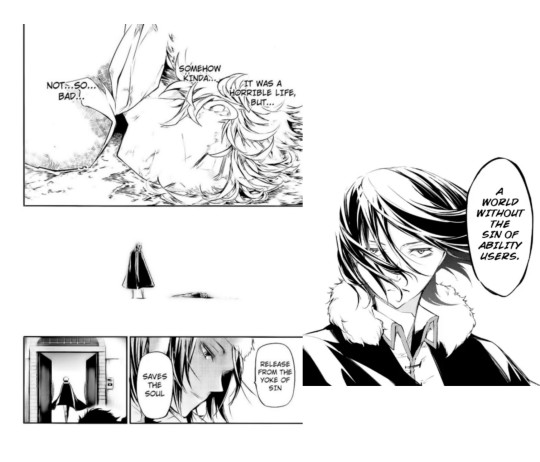
His character and ability are based on Crime and Punishment and that's literally what Dante's Hell is - endless punishment for one's sins. Moreover, Fyodor sees himself as the God's subordinate and Divine Comedy talks about the souls' sufferings because of their wrongdoings to God. It also talks about Dante's path to getting closer to God (metaphorically and literally), and Fyodor thinks of himself as someone between God and the people.
This analysis won't focus on him, but I wanted to point out the (important) religious themes in both of the stories.
What's also interesting is that Dazai and Fyodor (as the most dangerous ability users) had their cells located on the lowest level - similarly to Hell, where the worst people, traitors, were at the lowest ring. Although Dazai is a traitor to the PM, I don't think he parallels those from Dante's work, as they were meant to symbolize that betrayal is bad, but Asagiri shows that what Dazai did was good for him. They correspond to them in their "lack" of humanity and various commited crimes.
Now more of the similarities!
1. Briareus
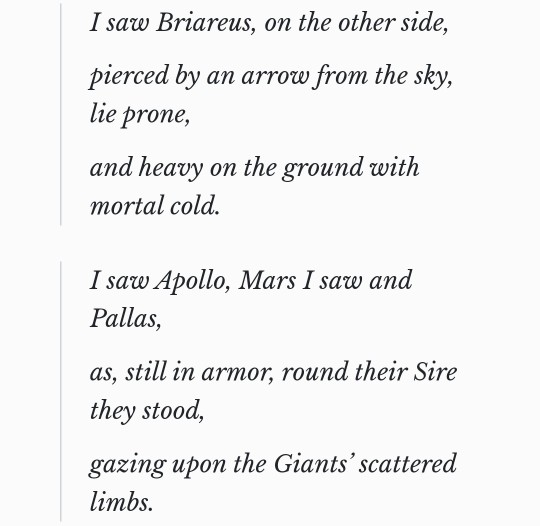
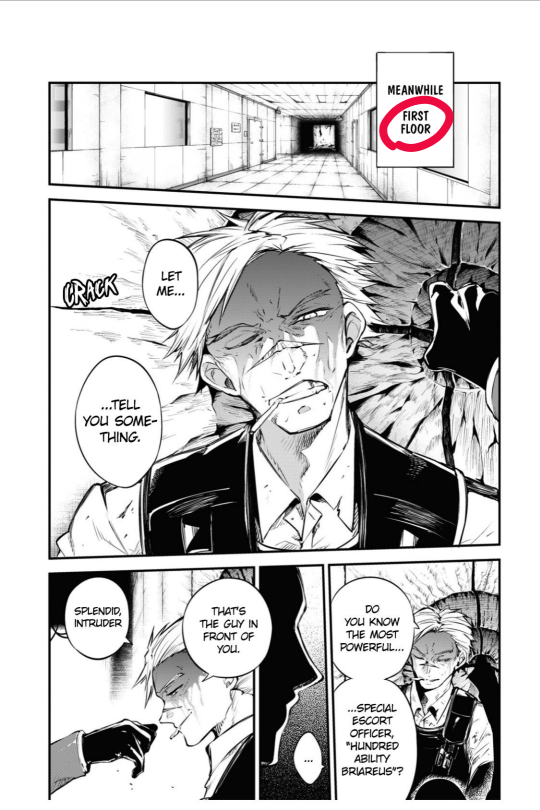
Purgatory, Canto XII; bsd chapter 98
The prison officer's nickname is "Hundred ability Briareus". In Greek mythology Briareus is one of the Hundred-Handers, who helped Zeus and the Olympians to overthrow the Titans.
Quick comparison to bsd: while bsd! Briareus gets killed by a person who's "working" for a prisoner, og Briareus eventually becomes a guard of those he was fighting against.
Briareus is also a character in Divine Comedy. He has two appearances: in Hell he's a giant inhabitating the Ninth Circle; in the first terrace of Purgatory he's one of the giants whose sin was pride. I'll focus on the latter, as it's more similar to the scene from chapter 98.
Dante's Briareus is a sympol of pride and bsd!Briareus says how powerful he is. Moreover, they're both more or less carved into the ground / wall (Dante's Briareus as a form of penance, bsd!Briareus by Chuuya's ability) of the first terrace / floor.
That would mean the Meursault prison is our Purgatory.
(more under the cut)
That scene also reminds me of the beginning of the Fifteen light novel, where Chuuya is really confident in his ability and makes fun of PM for being weak - interesting how he's the one to meet and kill Briareus (in Divine Comedy the meetings help Dante to become free of the sins). Also, the PM member from Fifteen is rather scared of Chuuya and shows him no respect, as opposed to the prison officer.
2. Flames and separation
In Canto XXVII, so almost at the end of Purgatory, Dante has to go through the flames in order to go to Paradise. Virgil can't come with him, as he's not Christian. Instead, he encourages Dante and reminds him of his free will.
In chapter 106.5 Sigma and Dazai also are in a situation involving flames, and even tho none of them actually go through them, they split up - Dazai doesn't leave the lift. Just like Dante and Virgil.
That, and the fact that a big part of Sigma's character is about being used (so not having free will) makes me believe they're paralleling Dante, making Dazai Virgil, their guide through the prison.
Sigma is in the process of finding themselves - similarly to Dante, who with the help of Virgil learns truths about love, good and bad, etc. This heavily reminds me of the conversation from chapter 105.5 about why Dazai chose them and his relationship with ADA.
Here's a comparison of their conversations:
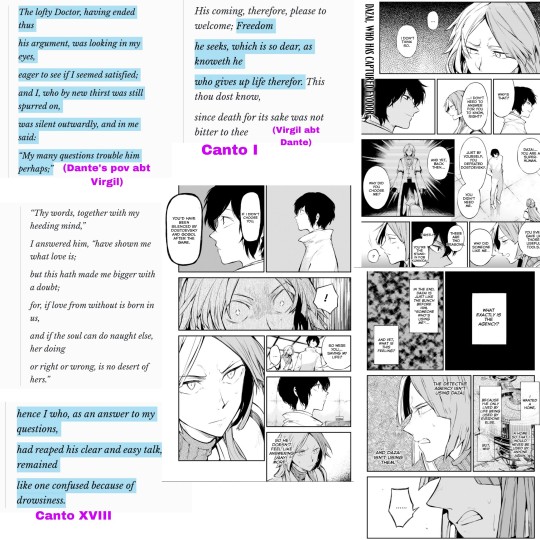

After Dante goes through the flames and leaves Virgil, he sees the march of the Church, and Sigma may find Fyodor in the next chapters. Moreover, Beatrice says the Church is divided and sinful. The people are going into the direction of the tree of knowledge of good and evil (the tree that Eve and Adam got their apple from). Fyodor's view on the world really fits that description, take dead apple and the manifestation of his ability as an example.
3. Water
In Canto XXXI (where Beatrice is the guide) Dante goes through the waters of the river Lethe, which makes him forget his past sins. In XXXIII (the last part of Purgatory) Dante dips in Eone and becomes fully purified.
That obviously reminds me of Fyodor and Chuuya, and then Sigma and Dazai, drowning.
Chuuya - he's currently a vampire (who, because of that, might not remember his past for now - Lethe?). Both the transition to a vampire and being dipped in water have metaphorical meanings involving changing as a person. That situation, along with Dazai's words, could have helped him gain consciousness, at least for a second (you know the whole "his eyes were back to normal" thing), and "cleanse" him from the vampirism. Moreover, in his speech Dazai talked about their relationship, and the one who was by Dante's side when he went through Lethe was Beatrice, his lover. She also talked about love (Canto XXX) and Dazai's farewell was really emotional and more authentic than what he usually says. (Of course I'm not saying they're lovers, just pointing out the similarities)
Sigma - before drowning in Meursault, there was a different panel that showed them being in water. Fyodor talked there about Sigma's loneliness in this world - is Sigma's amnesia similar to Dante going through Lethe? (Or: before coming into Purgatory, Dante had to be washed, because he had to leave his worldly life behind. I think that fact corresponds to Sigma's life even more). Then we got the recent chapters where Dazai saves Sigma. I didn't find many "cleansing" themes in that scene, except for that panel, which reminds me of baptism (it cleanses the person from sins and is done with water):
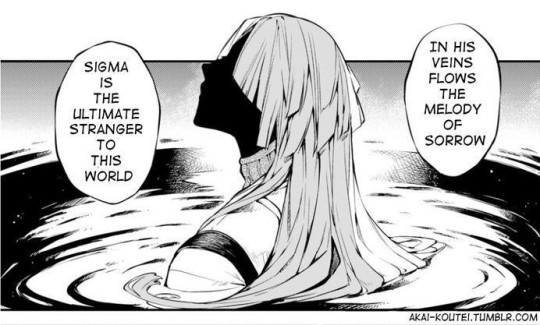
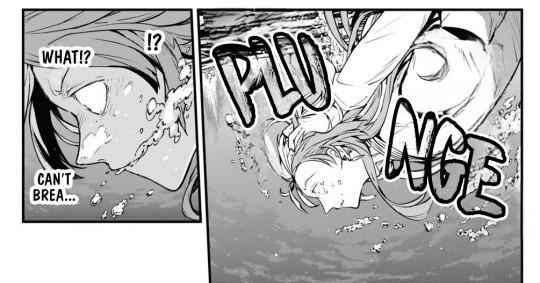
What we can also get from these similarities is that Dazai doesn't necessarily have to correspond to Virgil, but also Beatrice, another guide.
4. Dreams
Throughout his journey, Dante has dreams that help him understand things better in one way or another. In one of them he sees Beatrice, who I already compared to Dazai. Atsushi "hallucinated" as well, in chapter 105. In that vision he sees Dazai who makes / motivates him to move. Atsushi's much like Dante as well - they both are on a journey to become a better version of themselves, but also idealise their mentors.
5. Ango
Just like the spirit, Ango is helping Dazai and Sigma to go through the prison (upwards). Dazai also calls him an 'angel'.
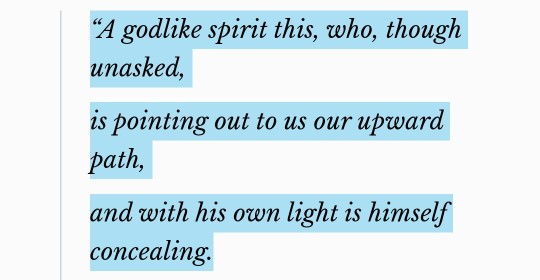
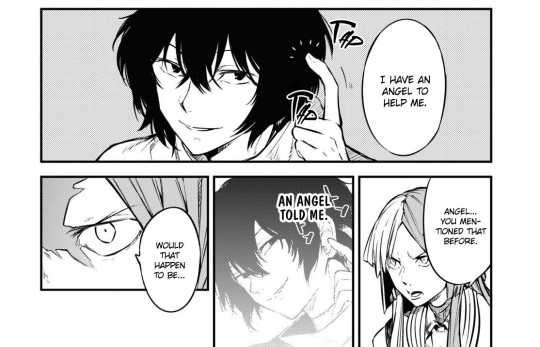
Purgatory, Canto XVII; bsd chapter 101
6. Mykola
The game Fyodor, Dazai and Sigma are playing was made by Mykola. One of the most famous works of the real Mykola Hohol is Dead souls, which some believe that he wanted it to be the Russian Divine Comedy. The book was meant to be a trilogy, but only one volume (that was meant to correspond to Dante's Hell) was created. I even found a reference to it, in which Chichikov (the main character) is compared to Dante:
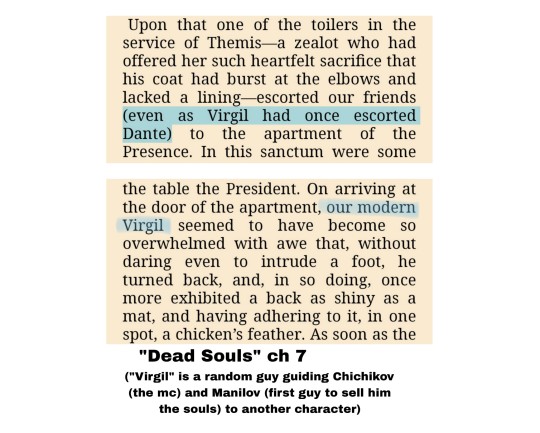
That point acts more as an argument for the game to be Hell, not Purgatory, but the relatedness to Divine Comedy is there. Or maybe it's more that Mykola wants the game to be like Hell, not Purgatory - either for Fyodor or Dazai, it's supposed to end in death. The other one's experience would be like Purgatory, tho, as he'd successfully leave the prison.
Or maybe, it's his journey that he wants to be like Chichikov and Dante's (since he wants to become free). Either way, that person is supposed to go through Purgatory later.
Also, does it mean the game is going to end before it was supposed to? If it hasn't already.
edit: more similarities in the reblogs!!
To sum up, I think one character doesn't have to correspond to just one person from Divine Comedy - and vice versa. Dazai is Virgil, but at the same time Beatrice, another guide, and also has some parts of Dante - he grows and goes through the Purgatory.
We don't have only one Dante - both Sigma and Atsushi share his traits and both go through their own paths to knowing themselves better (with the help of Dazai, too).
Bram and Aya's relationship is the one where, in my opinion, the levels of danteness and virgilness are most equal. Aya is Bram's guide, literally caries him on her back, but also shows him modern technology. Bram also helps Aya and guards her. Not to mention, they're at the highest part of the airport now, which means they have gone upwards.
I argued the Meursault prison is Purgatory, but I also found some similarities to Hell. It can be that it shares both of their traits, maybe depending on a character and what's happening to them.
The question is: is Asagiri writing this arc with so many similarities to Divine Comedy on accident or on purpose? Because if it was just the themes and archetypes that were alike, I wouldn't ask this question, but some of the things I listed are too resembling of Dante's work for me, especially Briareus and what happened in the lift. Not to mention real Hohol's connection to Divine Comedy.
If you have thoughts on this subject, please share! I've spent so much time thinking about this, I don't know anymore if I've gaslighted myself into thinking Asagiri must be doing it on purpose or not (but at the same time!! the similarities!!!). Yes, Dante is way older than every bsd author, but 1) we also have Shakespeare and 2) I believe it's a reference to Divine Comedy as a book, not that he'll be a new character (it'd be so cool tho). But even if it's not Asagiri's conscious doing, the similarities are still very interesting and I enjoyed looking for them.
#FINALLY FINISHED THIS WOO#really please please tell me your thoughts I am begging I need to know if this makes sense#thanks to that I brushed up on divine comedy bc i didnt remember it well and it's an obligatory read for my exams THAT ARE IN A WEEK 😭#also i dont consider myself a Fyodor expert so idk idk. Also if u have opinions varying from mine on this subject TELL please#bsd#bungou stray dogs#bsd dazai#sigma bsd#bsd sigma#bsd mykola#bsd fyodor#bsd chuuya#meursault arc#bsd 106.5#bsd 98#divine comedy#bsd theory#bsd analysis#bsd atsushi#it all started bc i was rereading this arc and saw the name Briareus 🙏🏻#bc why would asagiri include sm details about him?? THAT ARE 1:1 CORRESPONDING TO DIVINE COMEDY???#I hope I don't have many grammar mistakes in the post#dead souls#bsd literature
216 notes
·
View notes
Text
i was a reading a bit more on purgatory and purgatorius ignis (cleansing fire), which is a concept that existed even before the notion that purgatory itself was a third other-world domain, similar to heaven and hell, when i suddenly remembered dante's la divina commedia and decided to revisit the story a little. and i found something interesting as i was scrolling through the wikipedia page.
so, purgatory is the second part of la divina commedia, following inferno, and is an allegory telling of the climb of dante up the mount of purgatory, guided by the roman poet virgil. alegorically, purgatorio represents the penitent christian life (and christianity, as we know, is one of the core themes of fontaine's archon quests that arlecchino was a part of). while describing the climb dante focuses a lot on the nature of sin, examples of vice and virtue, as well as moral issues in politics and in the church. what's interesting, though, is that the poem posits the theory that all sins arise from love – either perverted love directed towards others' harm, or deficient love, or the disordered or excessive love of good things.
why is this interesting, you ask? let me add here a few quotes before i contextualise it:
"she is a god with no love left for her people, nor do they have any left for her" - dainsleif about the cryo archon, the tsaritsa
"her royal highness the tsaritsa is actually a gentle soul. too gentle, in fact, and that's why she had to harden herself. likewise, she declared war against the whole world only because she dreams of peace. and because she made an enemy of the world, i now have a friend in you." - childe about the tsaritsa
"everyone praises her for her kindness and benevolence, but they forget that love is also a form of sin. what if she's just trying to compensate for something?" - wanderer about the tsaritsa
the tsaritsa, the cryo archon and the person arlecchino is devoted to, is theorised and hinted multiples times to be the god of love. yes, the love that is said to be the origin of sin in la divina commedia. we can also draw parallels between the idea of perverted love talked about in the poem and the relationship between arlecchino and others, for instance the kids of the house of the hearth.
arlecchino's drip marketing including an excerpt where the scene goes from a gentle warm environment, seemingly mistaken as a loving family home full of innocent looking children, that quickly shifts into a somber and dark atmosphere under her authority - the children answering instantly, without hesitation and completely obedient -, is the perfect illustration of the duality within her character. there's an obvious exploitative and manipulative system making use of the house of the hearth and the orphans under its roof, where arlecchino (as the one running the orphanage) is the provider and the kids are brought up to be dependable and further dispatched as fatui soldiers when "potential" is recognised. and we can deduce that there's ways that their education is done from a very young age so it prevents or punishes any sort of dissent, something not hard to imagine when we know from freminet that arlecchino doesn't like when the kids cry or show emotional vulnerability, something she sees as weakness, for example. but if there's this dark side to her, there's also certain attitudes that demonstrate her care for the children or even her care for the world around her. arlecchino helping freminet get closure on his mother's death, the reformation of the house of the hearth (which we know used to have a much more punishitive and strict leader before arlecchino took over) or even her devotion and deep respect towards the tsaritsa are some examples of the way she shows care for other people. now, we can theorise that these good deeds directed towards the orphans under her care are very much purposeful to better manipulate them, but i think that's exactly what the notion of perverted love in la divina commedia tries to hint at.
besides this concept, there's something else that peaked my interest in dante's poem. dante pictures purgatory as an island at the antipodes of jerusalem, pushed up, in an otherwise empty sea, by the displacement caused by the fall of satan, which left him fixed at the central point of the earth. it's a cone-shaped island that has seven terraces on which souls are cleansed from the seven deadly sins or capital vices as they ascend. at the summit is the garden of eden, from where the souls, cleansed of evil tendencies and made perfect, are taken to heaven.
as we know, arlecchino is being introduced in fontaine, her homeland, and the idea of purgatory as an island in the sea leading its way to heaven caused by the fall of a sinful being sort of reminded me of remuria. remuria was the civilization in fontaine which directly preceded the previous hydro archon egeria's rule. its downfall occurred as a result of remus' attempt to avert its predicted destruction, and in particular, by his act of sharing his power and authority — reserved only for gods — with the four human harmosts he appointed to govern his cities. remuria eventually ended up being sunken into the abyss, devouring everything including the people and remus himself. we know there's still a region in fontaine's map that wasn't yet released, so how odd would it be that the last part to be revealed in fontaine might just be the land that was once sunken? after the little note about the samsara cycles near the tower of the narzissenkreuz ordo, which referenced a cycle called remuria, i would not be surprised at all. it's also particularly funny that fontaine is directly below celestia. yes, the floating island in the sky above teyvat which is the residence of the gods, the same gods that made remuria fall. as the contemporary philosophers of our time have said, that's sus!!!
i don't want to get too ahead of myself because i don't have a theory about what's going to happen or what role arlecchino will play exactly but i don't think it would be shocking if we got to know more about remuria during her release. and still in the purgatory idea, i think the angel of death (azreal) might be an interesting parallel to make with arlecchino. azrael's role is seen as benevolent, transporting souls after death. it fits perfectly well with the idea of purgatorius ignis, that signifies transformation. in different cultural and religious contexts, fire can also symbolize destruction renewal and even rebirth so i'm very very curious to see what arlecchino's story will be like.
#this is a very long one and it's not really a theory but i wanted to drop my thoughts because why not 😂#this + the idea of teyvat being inside a globe (either a domain or in the sea of nihility connecting with hsr) or the upside down theory#where the gods are actually trying to prevent 'enlightment' or are the equivalent to a demon realm which makes sense with the archon's name#would also be cool if arle ended up being a figure sort of like the grim reaper you know?#slightly different from the angel of death but similar enough concepts. [LEAKS ALERT] she's said to have scythe so that'd be freaking fun!!#does this make sense? i hope so. this was a bit of a mess but i just needed to write it somewhere before i forgot#if anyone reads this thank you so much for taking the time and sorry if it was actually really boring :3#arlecchino#genshin impact#genshin thoughts
25 notes
·
View notes
Text

[REVIEW] The Divine Comedy by Dante Alighieri
3/5 stars (★★★)
DISCLAIMER: This review is very unserious and mostly just me giggling over Dante and Virgil's gay tension.
Even with my Catholic upbringing and theological + historical Christian knowledge, The Divine Comedy was very difficult to read for me. All three parts were dense. Not only that, but this deluxe edition went all-out with the notes on the text and annotations, so even if one canto was only like 150ish lines it had 5 pages of heavy context that I had to slog through and try to apply to the canto itself. I ended up learning a lot about Dante and Italian socio-religious politics leading up to the 14th century, which was wild and, though objectively interesting, still extremely boring to me.
I will honestly say though that I was not prepared to read TDC when I first started it. Like I said, you need a lot of context and background information to even understand most of what Dante is even saying. He goes into theory, geometry, and philosophy so deeply (this edition had GRAPHS and CHARTS in the additional notes that's how insane this man was). While I would say you don't necessarily need that much context to read Inferno (which I agree is the best one out of the three), it is suicide to just throw yourself into Purgatorio and Paradiso without doing some research first, which is definitely why the later two parts TDC aren't as popular as Dante's shenanigans in Hell. I honestly would've given the entire trilogy a 1/5 star rating (based on my personal taste, mind you -- I acknowledge it's a 5/5 masterpiece that is truly worthy of being called "divine" so nobody come at me), but Inferno was entertaining enough to bump it up to a 3/5 stars. I never want to (re)read this again though. Phew!
Some necessary words on Inferno: The gay moments between Dante and Virgil sent me into empyrean heights of delight. When Dante realizes Virgil's ghost is in the dark wood at the beginning, he goes, "[M]y brow, in shy respect, bent low" and then Dante, totally unprompted, proceeds to say,
"You are that Virgil ... You are the light and glory of all poets. May this well serve me: my unending care, the love so great, that's made me search your writings through! You are my teacher. You, my lord and law. From you alone I took the fine-tuned style that has already brought me so much honor."
HELLO?????????? Then later on their way to Hell Dante hesitates before entering and asks Virgil, "You, my poet and my guide, look at me hard" and asks for reassurance that going down to eternal damnation is a good idea so Virgil, considerate boyfriend that he is, comforts Dante, which leads him to compare himself to "little flowers" bending "low" and "closed tight" and only open up as the sunlight (AKA Virgil) makes them "grow upright on their stems and fully open." EXCUSE ME!!!!!!?????? There were so many other points that went so heavy on the queer sexual tension:
"'...You, as you speak, have so disposed my heart in keen desire to journey on the way that I return to find my first good purpose. Set off! A single will inspires us both. You are my lord, my leader and true guide.' All this I said to him as he moved on. I entered on that deep and wooded road."
My God Dante you fruity little man.
Anyway, back to practicalities: I don't really recommend this Penguin Classics Deluxe edition of the texts if you want to actually read TDC in earnest. The annotations and supplementary notes were great and I think Robin Kirkpatrick (the editor) did an amazing job composing the entire thing, but I felt like a lot was lost in translation (and over-relied on explanatory notes), which really took away from the overall reading experience, so if you want to grasp the linguistic and poetic depth of Dante then this version is definitely not for you. The cover is very pretty though.
Lastly, even if I didn't really vibe well with TDC, I do now have a soft spot for Dante. I mean, how couldn't I? He spent over a decade composing this epic poem and he made it his personal goal to be as much a hater to the Vatican whilst also being such a pathetic boyfailure to all his literary seniors (crushes) as possible. There were literally so many times he portrayed himself as a little kid crying to his parents in the presence of Virgil or Beatrice. There was even a section in Paradiso when he described drinking holy water as like when a baby faceplants itself on its mother's boobs and I died laughing. I also think it was really funyn that when Dante finally reunites with Beatrice at the end of Purgatorio she's just mean to him. Like she's so mean and Dante eats it up like the FREAK he is.
#the divine comedy#inferno#purgatorio#paradiso#classics#book review#dante#dante alighieri#commedia#italian literature
4 notes
·
View notes
Note
the way these two outsiders could have been enemies but they just love each other so much they get on so well they're best friends they have each other to lean on 😭😭😭
from ep 1 greg could have been a threat to tom. but they!!! they're fucking besties! they make each other laugh and smile, in a world where people are rarely laughing and smiling. they're sooooo beautiful 🥺🥹
OUGHHHhhrrrr yeah yeah god fuck. please it's the best thing i ever seen. and yeah i always talk about that, how like. literally tg are the most genuine relationship on the show [save for conwilla, but they literally parallel it repeatedly too so], they stuck it out the entire way and [ted lasso voice] won the whole fuckin' thing. had their bumps as tom would say but came out the end even more in love than ever. taught each other. greg taught tom he was worth something, that he could stand up for himself, that he could fucking fight for himself and what he wants, cared about his well being when no one else gave a shit. tom taught greg the way of this world, mentored him, protected him when no one else would. they took each other seriously when everybody else looked down their noses at them, joked about them, insulted them, scoffed at them, and they proved them all wrong together. tom ever the virgil guided greg ever the dante through hell itself and they changed the stars at the other side and came out of it, [true] forgiveness being the final barrier before they could emerge and break through and out. they forgave each other for everything.
they do. they make each other happy. i don't think anybody else has or could make either of them that... content. i don't think anybody else could really truly forgive one another like those two have. nobody else really truly likes another as a human being, good and bad, richer or poorer, better or worse, in sickness and in health, like they do. they just........ [sighs deeply] they're so in love and they're best friends. what could be better than this.
22 notes
·
View notes
Photo

DracariOctober #21
Well now! Dante is going to have a >very< easy time with this Virgil to guide them through the nine circles of hell! We won't even have to spend the weekend at this rate! We're growing fast now! 230.5% more every day for the rest of the month! Thank you to all those who've donated so far! This year we're supporting the South Sound Reading Foundation in honor of Mondomonger/Axelroo. Thank you for being there for me for a decade! https://www.southsoundreading.org/ This year's interactions are going to be a little spicier! We're only going to be increasing heights by a little bit per interaction, but Donations will begin to exponentially compound the results! The earlier the bigger, the better, and borkier! Voting will be for the next day's theme! Since we're supporting a Literacy Foundation this year, I'll select four possible literary worlds to draw our Derggo into at their given height! Each one will only appear once, so vote carefully! So how do we make this Dracario bigger? You can help! Right now, here's how much Interactions are worth: Likes = 940.42m Retweets = 2351.049m Voting in the Poll = 940.42m Woah, these are so small! What can we do to change that? Every $1 donated will exponentially begin to increase these values per day, compounding +0.1% per dollar. That means the earlier you donate, the more growth it will compound down the line, and if my math checks out, he could be getting pretty huge, but will they stay on Earth? Only your donations will tell! https://www.paypal.com/donate/?hosted_button_id=H6ZB8M7EJ4QKE I will be counting Likes as Liking on Twitter or Favoriting on FurAffinity. I'd like to do more sites but I don't want to spend too much time collecting data when I could be doodling Derggo! Retweets will count both Twitter and Bluesky! Voting will count from the Twitter poll attached to the thread, or by visiting StrawPoll here: https://strawpoll.com/NPgxE4dx1Z2
Posted using PostyBirb
13 notes
·
View notes
Text
I am now realizing I don't think I've ever really explained my Succession-Inferno analogy but it is something near and dear to my heart so. Buckle up I guess!
The whole thing is premised on the idea that Logan holds a lot of characteristics traditionally ascribed to the devil in literature. He's an excellent liar (far better than anyone else on the show), he goes out of his way to destroy relationships between other people because he can't stand it when people love others more than they love him, he presents himself as "uncle fun" to outsiders, he actively revels in sowing discord and conflict and betrayal whereas everyone else merely tolerates it. At the same time everyone around him treats him like a god. He deserves all their love, he is The Father who has created all they see, reality is manifested by his will and is simply whatever he wants it to be, he is all-knowing and all-powerful. But because their god is actually. you know. evil. the fruit of his continued power (and their continued worship of him) is nothing but misery and lies.
In Dante's Inferno, Dante goes on a journey through Hell, guided by Virgil. Virgil represents two things: the knowledge of morality necessary to understand what's happening in Hell and avoid being taken in by it, and the moral support and courage necessary to complete the journey. Dante journeys through nine circles that are meant to represent sins of increasing moral degradation. The first is limbo, who's actually just people who weren't bad at all but were never baptized and so can't go to heaven. That's where the pagan moral philosophers - including Virgil - are. After that, it's Lust, Gluttony, Greed, Wrath, Heresy, Violence, Fraud, and finally, Treachery. The order is very intentional, and rooted the belief that the early sins (sins of the flesh) are the easiest ones to fall into and ultimately are not as serious as the others - but, they also serve as gateways to the more serious sins. Each circle has sinners being punished in ways that are metaphors for the impacts of their sins. The devil sits in the ninth circle of hell, Treachery, where everyone (including the devil himself) is frozen in ice. The devil has Brutus, Judas, and Cassius in his mouth, and he chews on them for all eternity. Everyone around him betrayed someone they had an obligation to; the worse the betrayal, the closer to the devil they are frozen. The furthest away are those who betrayed their families (Cain); then those who betrayed their countries (Antenor); those who betrayed their guests and those who sheltered in their homes (Ptolemy); and finally, those who betrayed their masters, lords, and benefactors, which includes the three in Satan's mouth.
If Logan is Succession's Satan, then two things follow. First, Waystar becomes a metaphorical Inferno, where climbing the ranks to get closer to Logan requires climbing through the circles of hell and participating in greater and greater moral degradation. I think the character this most applies to, because we actually get to see his corruption arc over the course of the show, is Tom. And his arc, I think, arguably fits with that journey into hell. Season 1 gives us Gluttony and Greed, especially in 1.06 when he takes Greg to the restaurant and gives his spiel about how great it is to be rich. We also get his general obsession with nice things and with stuff, something which the Roys don't have, and something that seems to fade in Tom as his arc progresses. Season two gives us Wrath and Violence (Safe Room etc.), and Fraud (the cruise line scandal coming out). And then finally, at the end of season 3, we get Treachery. And I find it very very interesting that immediately before committing the act of Treachery, Tom asks Greg if he wants to make a deal with devil - something which turns out to mean both a deal with Logan, but also the act of betraying Shiv. Up until this point, you could argue that Greg had been riding along on Tom's coattails on this journey-through-hell - but the line "What am I going to do with a soul anyways?" means that, for the first time, he's actively consenting to what's happening. Sure, he doesn't know what's going on - but the line itself implies that it simply does not matter to him.
The second thing that follows, though, is that while Tom and Greg and the old guard have journeyed down to where Logan is, his children have been there all along. They grew up in a world characterized by Treachery, Fraud, Violence, Wrath, Greed, and Lust. Their arcs aren't about them becoming corrupted; their arcs are about whether they can escape the corruption they've always lived in. Everyone is frozen in that same ice together, but the ways they got here were very different.
Finally, the Virgil character is very important, because he doesn't have a corollary in the Succession half of this analogy, and that highlights what none of these characters have. None of them have a strong moral compass, and even if they did, none of them have the kind of support and moral courage to resist the allure of temptation. This is far more devastating for the Roy kids, though, because they've never had the opportunity to encounter a Virgil, whereas everyone else had to pass through Limbo - where Virgil is - before they could start going through hell. Or, in other words, with Tom et al. at some point there was an active choice to reject the moral compass and reject the moral support, which the Roy kids never had. But once you reject your moral compass it's hard to get it back again, hence why the further you get from Limbo the harder it is to find your way back.
#succession#didnt include this in the main post bc I didnt want it to be too long BUT#I also think there's an interesting tomshiv angle here#where. if shiv has been immersed in this world of corruption and moral degradation her whole life (ie frozen in that ninth circle)#is there really a world where they can be together and tom doesn't end up in that same corruption?#shiv isnt the one who corrupted him. not at all. but her whole world is corrupt and so entering into it is the only way to get close to her#its not her fault he entered into it in the first place bc he clearly did before he met her#but once he marries her he ends up even more committed and its even harder to get out#I also think there's an interesting angle re: dante journeying through hell to get to beatrice#who represents true pure selfless love#BUT he can make it through hell bc he has Virgil. so he DOESNT get sucked into the corruption and he DOESNT get stuck in the ninth circle#and HE gets to pass through the other side of hell and head towards heaven#I have a creative writing piece I started forever ago where tom has to take a dante class in college and over the course of the show begins#rationalizing his choices as part of a journey through hell where on the other side is beatrice ie: love#bc he's so invested in being in this world and his marriage is part of the world#and then finally realizing oh fuck actually im in the ninth circle and there is no beatrice on the other side#there is no redeeming quality here and I dont think my marriage can be saved#and that leads into to the choice to betray shiv#because you're already in the devil's domain and you have no virgil to help you out. what else can you do#not that the situation justifies his actions. but it creates the moral apathy required to go through with it#bc genuinely I do not think he would have betrayed shiv like that in season 1 or season 2#so the question is what about him changed#and I think the progression of his corruption arc is a big part of the answer to that question#not the whole answer but it is important#maybe I'll finish it one of these days lmao
25 notes
·
View notes